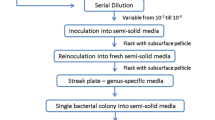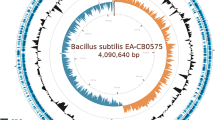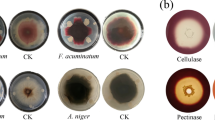Abstract
Thirteen of the most abundant Gram-negative bacteria which are able to grow in N-depleted culture conditions were isolated from the rhizoplane and endorhizosphere of canola (Brassica napus) and identified by 16S rDNA sequence analysis. Eight of these bacteria induced a significant increase in root dry weight ranging from 11 to 52%. Phylogenetic positioning based on 16S rDNA sequences indicated that at least four genera are represented, Pseudomonas, Variovorax, Agrobacterium and Phyllobacterium. The most important direct plant growth-promoting-rhizobacteria effect was found with both isolates belonging to the Phyllobacterium.
Similar content being viewed by others
Author information
Authors and Affiliations
Additional information
Received: 18 April 2000
Rights and permissions
About this article
Cite this article
Bertrand, H., Nalin, R., Bally, R. et al. Isolation and identification of the most efficient plant growth-promoting bacteria associated with canola (Brassica napus). Biol Fertil Soils 33, 152–156 (2001). https://doi.org/10.1007/s003740000305
Issue Date:
DOI: https://doi.org/10.1007/s003740000305




